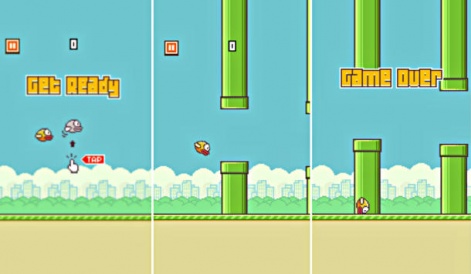Love it or loathe it, Slither.io has proved that even the most basic of ideas - even ones heavily inspired by other games - can prove to be mega hits.
And when you consider that it was made by just one person, it just goes to show that app store success - at least in terms of downloads - is anyone's game.
With that in mind, we wanted to get our Indie Maven's views on the success of such games, and what effect it will have on mobile games in the future.
More specifically, we asked:
- Do you think the success of super-casual games like Color Switch and slither.io will affect how indie developers approach making games for mobile?
- Are these games evidence that tiny teams can still "make it" in mobile?
Whenever any media is majorly successful, a torrent of clones, lookalikes, and “works inspired by” are inevitable. Think about how many monster collecting RPGs there were in the 90’s after Pokemon. Heck, slither.io is technically a clone of Agar.io!
This kind of “me too” design is common after a success story and is done both consciously or unconsciously.
This doesn't just affect indie developers, but the industry at large. Would we have as many crafting and survival games in the AAA space if it wasn’t for Minecraft?
It's not a question of can tiny teams “still” make it. Tiny teams have and always will be able to make it! A team size is not directly correlated with the success of a game.
There are more than enough small team successes in the apps industry for them to be perceived as exceptional circumstance: Downwell, Ridiculous Fishing, Badland, Nom Cat, and anything by Mediocre Games, just to name a few.
I don't think so. I think there will always be a nice variety of games into indie dev scene.
There will always be a nice variety of games into indie dev scene.Pierre-Luc Vettier
As long as some developers don't like casual games, we will see a lot of more hardcore games in stores.
For sure, we will see a lot of more or less cheap clones of these games in the following months, but it will not affect durably our industry and our approach.
Are these games evidence that tiny teams can still "make it" in mobile?
For sure they can! If one day, tiny studios realize none of them will be able to "make it", they will just stop trying making games for mobile.
Video games history is fill of small studios and tiny teams that had awesome success despite limited resources. That's the charm of this industry.
This depends on the indie in question.
Their success does reinforce the idea that if you take something that’s already done well, clone it, tweak it with your own improvements and get everything right, *plus* get lucky, you’ll have a hit on your hands.
So some smaller devs (and larger ones for that matter) are likely to follow the trend, and hope to stand out in the latest swarm attack on the App Store.
Others may decide not to for various reasons. It may be too late to jump on this particular bandwagon (maybe not - there are still Flappy Bird clones charting for instance).
It might seem a bit too much of a gamble to try and get visibility amongst the other clones in this swarm, or the devs may simply decide it’s not a particular game type they want to do.

This could be because it’s not a game style they find fun themselves, or they simply don’t want to be thought of as ‘cloners’.
I’m not intending to be negative towards slither.io’s developers though. Good on them for spotting a niche that still needed filling (look at the AAA companies who’ve made their fortunes constantly re-filling the FPS niche, for instance) and getting everything right while doing it.
All the other mobile games written by small teams that are at least covering their costs.
It’s not an indicator that the small team mobile development scene is healthy though.Aaron Fothergill
You do have to get everything right and possibly get a bit lucky to do so, but there are enough 1 and 2 man teams out there with enough skill to get a game out the door to overflow the new games categories on the various app stores many times over, so there’s bound to be one or two of them do well for one game.
It’s not an indicator that the small team mobile development scene is healthy though. While some teams have managed to keep things going with at least a minor hit after their breakout one, there are a lot of one hit wonders.
And when majors such as Rovio and King (or even Mojang) can’t follow up initial casual hits with anything near as big, it’s a worrying sign that it’s all one big slot machine.
The latest free to play successes really shouldn't change how developers approach games for mobile, if only because "free games should be casual" has been known for years now.
With a free game you're going for as many downloads as possible. This really encourages three things:
- Making your game as casual as possible. You want the biggest potential audience, with a free game.
- Making your game a clone of something that's already incredibly popular. Or at least go for "similar to this thing millions of people like, but with a twist". SOMETIMES you can get away with "clone of this thing a lot of people outside the western world like, but isn't popular in the US market yet".
- Ideally both of the above.
Looking forward to freddy.io.Kepa Auwae
If anyone has a counterexample, I'm interested.
Like others said, you'll maybe get a lot of clones that are trying to jump in on the "popular thing".
Looking forward to freddy.io.
It's lIke slither.io, except the snake heads are replaced with stolen Five Nights At Freddy's art.
Viral hits don't have a team size requirement. Or a requirement of anything, really. As long as they're made to appeal to the widest audience they can.
What do we define as a "success"? Only the creator(s) can say whether the game was a success or not.
If the intention was to make loads of money with a F2P game, millions of people downloaded the game but only $3,000 was made off it... Has the game been a success?
If the aspiration was to get critical acclaim and win awards, the game has sold over 5 million copies but every critic tore it to shreds and didn't win any awards... Has the game been a success?
Only the creators can say whether the game was a success or not.Erik van Wees
I think game news/blog websites can heavily affect people's priorities. If the focus is mostly on something being arbitrarily successful, certain people can't help but be affected by that. "Success" will then be the drive behind creation, whatever that "success" means...
I didn't know about these games (except for Agar.io) until this question was asked, let alone knowing whether they were "successful" or not.
When does something "make it" according to you? When has your goal been achieved? My drive is to be able to communicate the intended experience as best as possible and to enrich people's lives.
If someone would come up to me and mentioned he/she has been moved/intrigued/inspired/etc. by my work (and the reasons why would be very similar to my intentions), then I would consider myself a happy camper.
Everyone can "make it" as a team or as an individual. It all depends on the goal(s) you have defined.
This success may only lead a developer in a wrong direction.
It's pointless to copy only a publicly visible part of a success scheme knowing nothing about what stays behind.
A casual game setting that is, in fact, suitable for a broader audience and viral factors do have effect, but their influence is quite overestimated - even combined, they won't help to sustain download numbers for long.
I think it's only natural to look at successful games and see what you can learn from them. Sometimes you may not think it applies to what you do and move on.
You may try to ape it wholeheartedly, but most commonly some small part of that game may influence the direction you take.
A good example would be Crossy Road.
Most clearly you see its influence in the many endless voxels games that have sprang up since, but many games that are not visually or mechanically similar have still aped their monetisation model.
Some ideas will influence devs more than others and stick around.Matthew Annal
Perhaps slither.io will influence some dev to base their game around a similar online design theorising that it is what makes a game go viral. It may be very different in every other way, but it would still have affected that game.
It would be silly to say that success of anything will not lead people to analyse the reason for that success and potentially try to incorporate that into their games if it's a good match.
Are we all going to blindly stop what we're doing and make only games directly influenced by these games though? No, of course not.
There have been many successful games before these and there will be many after. Some ideas will influence devs more than others and stick around.

First, as others have said, the size of the team doesn't matter. You can have a single person put together a hit, or you can have fifty people put together a dud.
I feel increasingly that there are no determining factors for a hit, especially on mobile. No one could have predicted the success of Flappy Bird, but it happened.
The ceiling is higher on mobile but the floor is much lower compared to Steam.Tom Sennett
You can try to swim in the wake of trends like that, and you might be successful, but you'll never really disrupt things, and nothing is guaranteed.
Mobile is brutal because it's so big. The only way to succeed on mobile is by serving a niche, or by hitting the lottery with an App Store/Play Store feature.
I got featured on the App Store out of nowhere and ended up with half a million downloads (with absolutely no way to make money off it, natch), and all my subsequent games have not come remotely close to that.
There are SO MANY GAMES on the App Store, which is super awesome for games as an art form, but that makes it difficult for any individual game to stand out, especially when there's a monolithic entity like Apple controlling what people see.
The ceiling is higher on mobile but the floor is much lower compared to dedicated gaming platforms like Steam or consoles.
That's the new reality though, and it's only going to get more pronounced. Mobile is a big driver of games being more mainstream, which creates more competition, which again is awesome for the art form, but it makes things more of a struggle for the average indie.
We're only going to see it more and more as platforms become more open (which, again, is a good thing).
Thinking back on my answer, I'd like to reiterate that if you're making a free-to-play on mobile game, or, hell, a paid mobile game, the less-doomed route is to make it as casual as you can.
By that I just mean everything you make should hit the largest target audience possible. The much sought after 3 to 120-year-old, never played a game or held a phone before demographic.
My games serve a niche but I don't recommend doing so.Kepa Auwae
Ideally a cute but bland theme that appeals to either gender but you can focus on one gender if you want!
Free game idea for the reader: Bejeweled For Men. Icon could be a close up picture of screaming CGI man's face.
It's mostly just due to the charts. You want the biggest audience possible so you get the most downloads your game can so you get up higher in the charts so you get more downloads etc.
Make a game designed with "everyone" as your audience! Try not to think of this as actually having "no one" as your audience. Ideally this game you make should also be developed extremely quickly, since your chance of failure is really high for stuff like this.
Or do the other strategy: Look for something that's incredibly popular on another platform and make something similar to it on mobile. You can have a specific audience that way. The audience is "people that liked the other thing but want to play it on the toilet/play for free (on the toilet)".
My games serve a niche but I don't recommend doing so. Just because I'm not sure who else is surviving making weird or big and original niche games on mobile at this point.
I know there's some, just not a lot. That number keeps going down as they WISE UP D:
In general, as some developers get inspired by success (and what Apple features), I think we will see more ideas following similar, sticky gameplays.
Color Switch is a great example of a casual sticky gameplay, similar to the trendy simple Ketchapp games.Sebastian Lindén
However, I don’t think this will change indie developers approach of making games.
I think games like Color Switch and slither.io show us more what specific segments of users prefer at the moment.
Color Switch is a great example of a casual sticky gameplay, similar to the trendy simple Ketchapp games, that a majority of “new” casual gamers, that have not played games before prefer at the moment.
However, slither.io, published by Miniclip, shows how you still can take great online browser games to mobile, similar to agar.io. The session length between Color Switch and slither.io differs though as they are two different type of games.
I think tiny teams have a humungous possibility to move fast and work with early feedback from the first users.
As a small team, I think it is a matter of understanding constraints and focusing on the strengths in the team, instead of building infrastructures for months or years that in the end won’t support more than a few thousand users.
I think Color Switch shows a trend that small indie game studios have started experimenting with simple casual games, and shorter productions.
- Do you think the success of super-casual games like Color Switch and slither.io will affect how indie developers approach making games for mobile?
I don't think so, there has been plenty of successful super casual and simple games over the years. I don't see a new trend here.
- Are these games evidence that tiny teams can still "make it" in mobile?
Of course they can!
There are still many tiny indie studios making games and doing quite well, I think we're all just overshadowed by the giant studios now and the crazy amount of money that they make.
The fact that there are so many games coming out now compared to a few years ago also make it seem worse than it actually is as well.
Perhaps getting rich from your tiny mobile indie game is more difficult today, but making a good living from game development for mobile as a small studio is still very possible.
Flappy Bird was a HUGE influence for us, but those influences had nothing to do with the game/gameplay per say.
Flappy Bird was a HUGE influence for us.Travis Ryan
Whether Dong Nguyen knew it or not, he executed on a ton of design smarts; a super streamlined UX, one-touch input, every play tutorial, addictive difficulty, a distilled and easily communicable game language, and, of course, a cracking marketing stunt in pulling the game for its unhealthy addictiveness.
From a design standpoint it was liberating to see all the typical game product BS just tossed out. The ripples of that game have become almost shorthand for arcade pocket play.
Creatives are big sponges, absorbing and dissecting everything. So when you’re trying to pull something together with a popular touch, it’d be foolish to ignore audience trends and expectations, whether the product goal is to advance or find a niche to carve.
The industry needs these smaller teams to explore and discover new things that risk adverse bigger studios find difficult to support.
Anecdotally, I found these success stories inspiring; I was seeing pure arcade experiences in a new home with a bigger audience than ever, and I wanted to be in that space again.
































